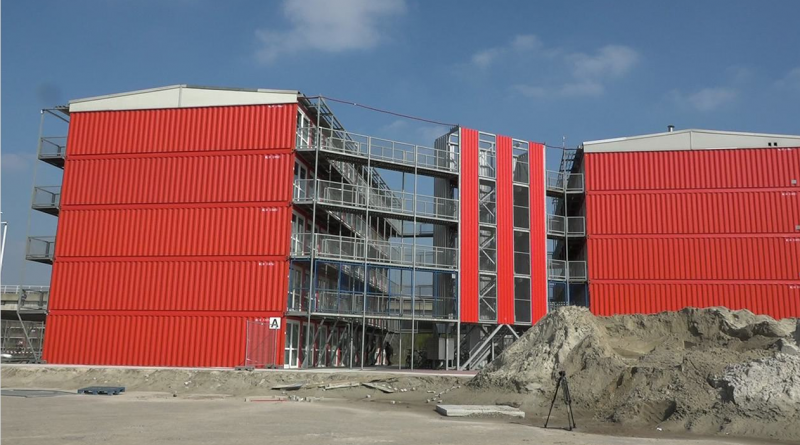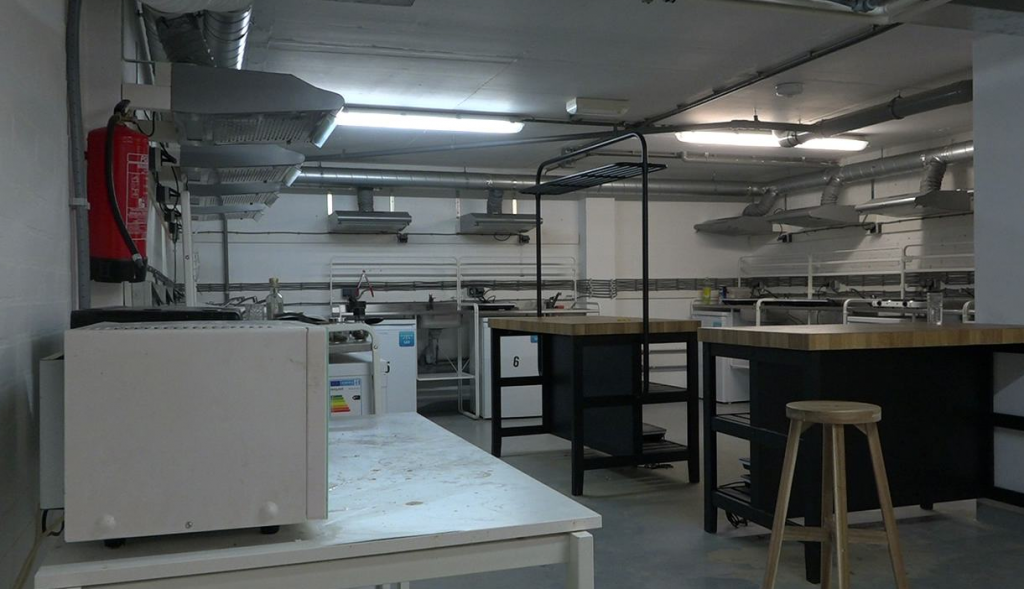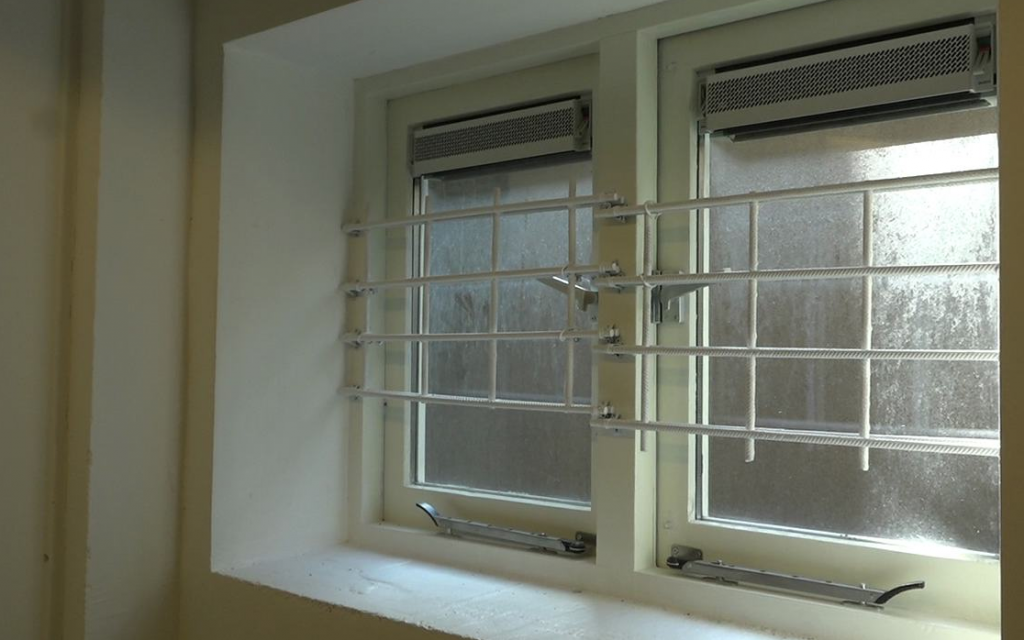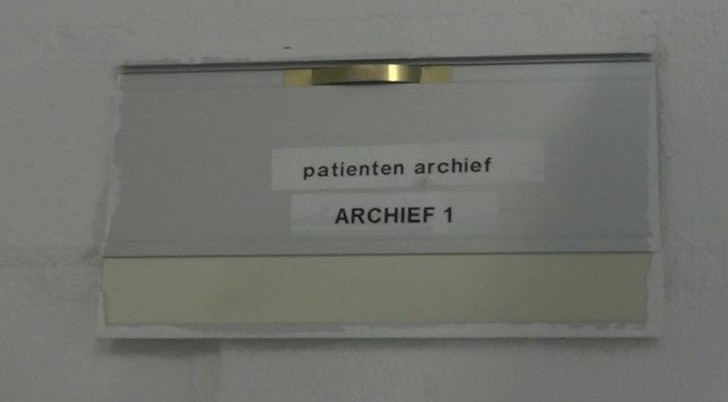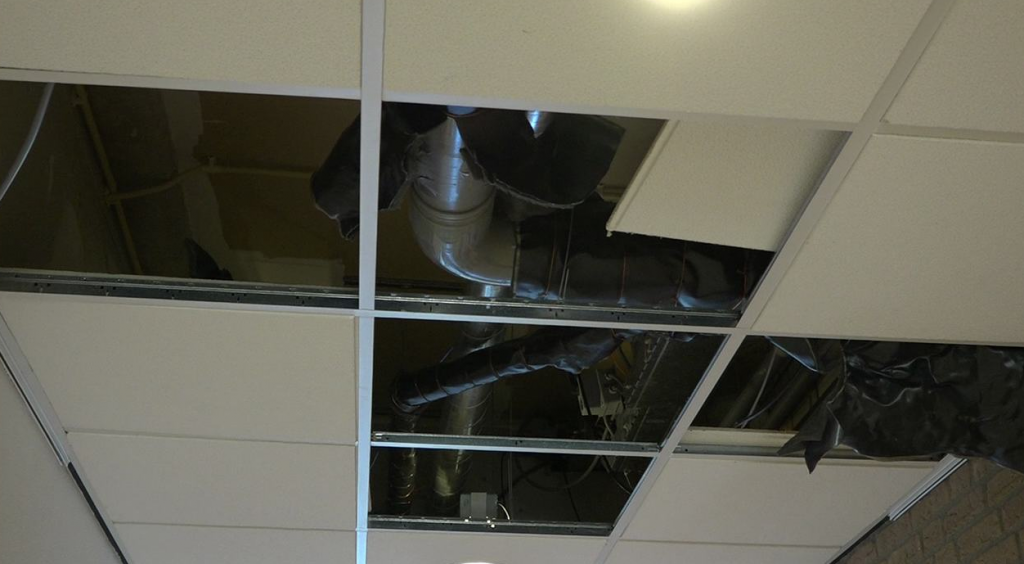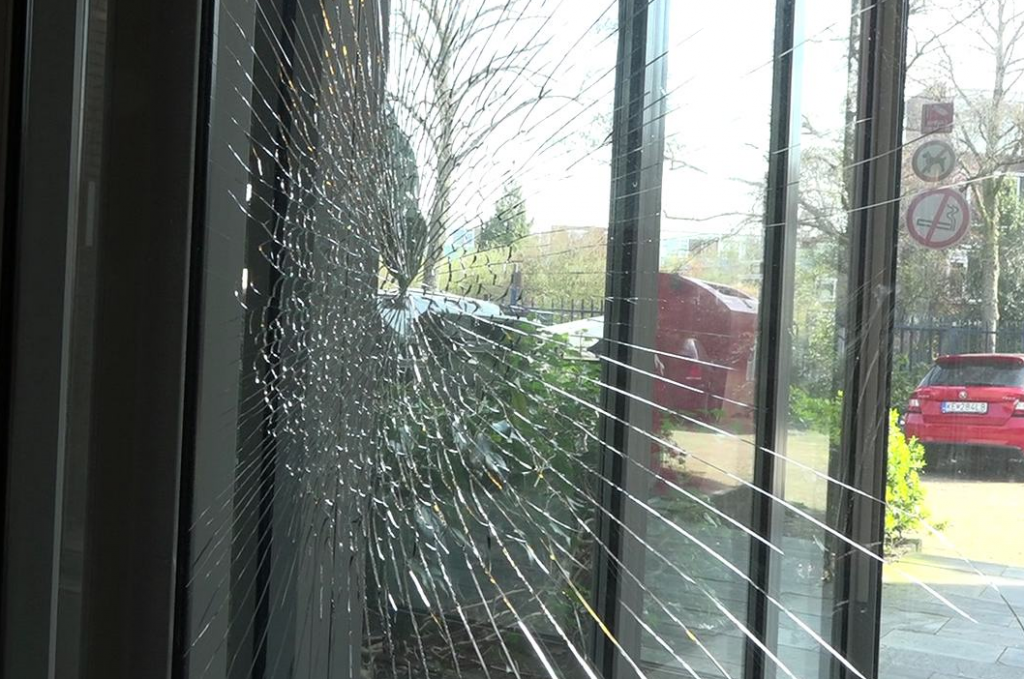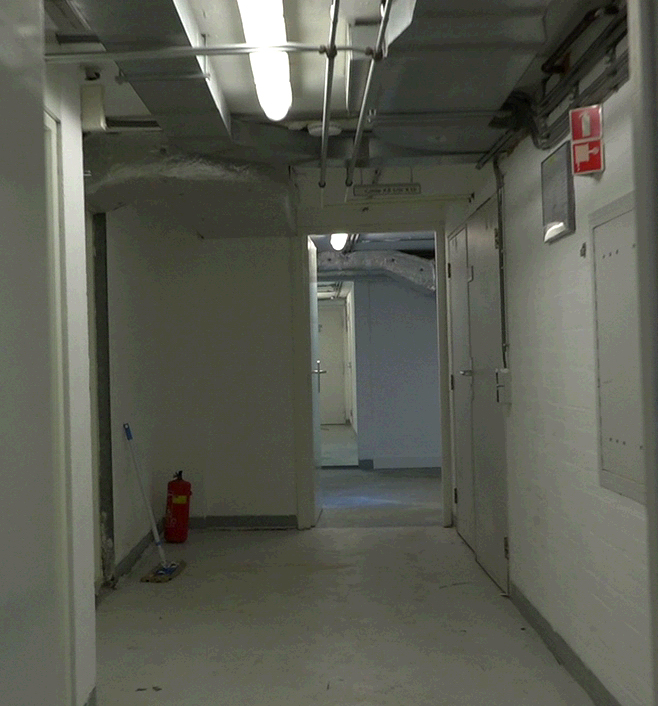The one that got away: why are we heading for another housing crisis?
Predators prey on the most vulnerable, goes the old adage. Rogue landlords exploit international students, says the Groninger translation. And don’t be fooled by the promise that next year is going to be better. The RUG itself admits that we need more rooms to house incoming students. But they won’t be ready in time, warn local politicians.
English student Angus Pringle (18) wears a light frown as he meets the midday sun outside a lengthy studio he calls home. Neatly groomed and donning the white shirt of his favourite football club, he is perched on a small black stool just outside his front door. “It gets quite lonely in this place. I have no one to talk to,” he says, staring at the patch of dirt at his feet. A tape striped with red and white separates him from the muddy plain below. Behind him, a bright red transportation container turned into a temporary room. On top of it – another one. And another one.It´s as if Angus was living on a cargo ship stranded on a building site, with only loud drilling machines and the menacing claws of bulldozers to accompany him. “This was not what I was expecting.”
Angus is one of 249 students living in the Suikerunie container complex. With identical containers/rooms stacked on top of each other on the remnants of Groningen´s former Sugar Factory, the iconic “sugar-home” facility has already become an urban legend in its short existence. But Angus’ home, enveloped in the infinite hum of cars streaming down the highway just a few metres from his top floor neighbours, is anything but sweet.

You’re (not so) Welcome
Groningen is seldom a hot topic in national news, except for the occasional earthquake that prompts local farmers to grab their pitchforks. Yet, in the autumn of last year, the city monopolised headlines across the country. But the spotlight was rather stingy.
Hundreds of international students coming to the RUG in late August 2018 didn’t manage to find a room in time for their arrival. They had no choice but to sleep in overpriced tents or crash on the couch of a generous RUG employee, stadjer, or a fellow students. The crowd of incoming international students kept growing while the construction of new rooms couldn’t keep up. Man became temporarily homeless, finding refuge in overpriced hotels, botels, tent camps, or simply under a bridge. In the end, something went terribly wrong with ‘welcoming’ international students in Groningen last year. The diagnosis was clear: housing shortage. But who was to blame for not curing the symptoms? The RUG, the Hanze, or the municipality? Perhaps rogue landlords exploiting the crisis?
A deafening silence has fallen over the city’s rain-battered roof tiles ever since. But the cause of the problem is far from being solved. Instead, it has been swept under the rug while living conditions in emergency locations continue to be anything but convenient and the perspective for next year is no better by any means. What went wrong, what is still wrong and why will it go just as wrong next year? Follow our guide to this housing maze.
Deception and Disappointment
It is June 2019 and, barring a few exceptions, students no longer sleep in tents, empty schools and couches. Instead they are lodged in “emergency housing” the university had hastily arranged for with the help of the municipality and private landlords. Internationals now live in containers, a former rehab clinic, and an old-fashioned care home. The RUG pretends the mess has been cleared up. “Right now, there is basically no problem. If you check the websites providing rooms in Groningen, you can see that there are rooms available, said Jorien Bakker, the University spokesperson, in a previous interview. “So at this moment, there is no problem.”
But many students still live in subpar, “shitty” conditions. And hope seems to be fading for next year’s crop, too. Both for new students and second-year returnees who will have to find a new room. If you fall in one of these categories, you better prepare for deception and disappointment. These are only understatements of what homeless students encountered last September, when various emergency locations were being offered up last minute by the University.
“It looked quite nice on the website”
The container complex at the former Suikerunie terrain is advertised as a top location. “Rough terrain, industrial history, unique value in terms of nature and culture. Location relative to the city centre is perfect, an awesome place for short stay housing,” reads the advertisement from Rizoem, the containers´ managing company. However, the reality is far from being this rosy, as many students have painfully experienced.
Englishman Angus is still renting one of the containers at the ‘Sugarhome’ complex. He found himself stuck in a situation that could not have been further from what was promised to him online. “I just took it, ‘cause it looked quite nice on the website. They had pictures of everything being green. It looked like a good place to live,” he says, trapped in his tiny “front yard” consisting of a minuscule strip of concrete floor tiles lying disorderly between his container and the vast emptiness ahead.
Rehab Facility? “Gezellig!”
Journalism student Dimitra Karapanagiotou (23) found a room in a ‘student house’ at the Vondellaan in the southern part of Groningen. The partially renovated building used to be a rehab facility. Some residents claim it was housing drug addicts and/or alcoholics prior to its refurbishment.They say that Qrent, the building´s management company, advertised the premises as a “former office space”. But for Dimitra, it makes no difference. “It felt disappointing”, she remembers her first impressions of her new home. “I expected this big student house where everyone would hang out, but in the end it was just a building under construction. The longer I stay here, the more I realise how crappy it is.”
Angus and Dimitra represent just the tip of the iceberg of hundreds of deceived students who were desperate enough to fall for empty promises. Even after months of constant complaints, there were still no signs of improvement. Vondellaan residents kept complaining about fickle electricity and slow internet half a year after their move-in. Day-in, day-out, the uninviting building haunts the students with reminders of the addicts and tormented individuals who wandered through the clinic´s halls in past times. Windows are shielded with bars and the names of patients and doctors are still attached to the walls hugging the rooms.
Nearly a year passed, and the building still appears to be under construction in some parts. A damaged pipe spills water over the floor in the shared kitchen. The laundry room suffers from broken washing machines. Burglaries used to be everyday business before tenants installed a “wall of shame” of unwelcome individuals in the lobby. Only then came the security cameras. And the landlord? Barely ever picks up the phone.
Work in progress? Not at all!
Walk over to the hollow courtyard of the Suikerlaan and you´ll hear a similar whisper of dismay and unfulfilled promises. Instead of the aesthetically pleasing green common area, the students got a building site, with nothing but sand and stones. The barrier tape and construction materials indicate work in progress, but time seems to have stopped since September.
“A metal box is not a home,” thinks Lieke Schoutens (24), a councilwoman for the Green Left party. She is responsible for her party’s housing agenda in Groningen´s city council and knows how deep the problems run. She mentions safety and privacy as absolute necessities for any student housing. “You can’t have thin walls so you hear your neighbour breathing. We need to provide basic comfort. Otherwise it’s unacceptable.”
“A metal box is not a home”
And the RUG continues to tap itself on the back. “I think the containers are pretty cool, it looks very fancy”, Jorien Bakker of the RUG said. “Personally, I don’t like Vondellaan all too much, but still I think it can be quite gezellig…” One can only wonder what Ms Bakker would say had she actually spent a night in the former room of an addict. Still gezellig?
A Modern Form of Exploitation?
If you’re forced in the corner and you grudgingly agree to spend a semester or 10 months in such discomfort, you would at least expect to pay a relatively low and reasonable rent. But guess what – bigger and much more comfy rooms in the city center are even cheaper! But their central location and scarcity mean that they are almost exclusively reserved for Dutch students.
A room at the Vondellaan costs on average 400 euros a month. Living in a container will take 500 euros out of your pocket each month. Excluding internet. Rogue landlords are taking advantage of merciless market forces in a predatory manner, preying on clueless students who are often left with no choice but paying absurd rent for shabby rooms in grim surroundings. But the delusion called ‘emergency housing’ is just one of the many symptoms of Groningen’s deepening housing crisis.
“They ask you to pay ahead and disappear”
Housing scammers lurk in the shadows of Facebook and other social media, waiting for their innocent victims to walk straight into the lion’s den. There are dozens of “fake” groups and pages on Facebook that advertise non-existent rooms for rent and are often run from abroad. “They will ask you to pay ahead and then just disappear. Never pay anyone before actually having seen the room,” says Elzo Smid (56), a graphic designer and activist who flags housing scammers on Facebook. In his three years of exposing fake landlords online, he has come across more than 40 cases of people losing large sums of money to scammers. “It’s a game of cat and mouse. Warning each other is all we can do.”
A great deal of the problems concerning both rotten living conditions and unreasonably high rent for crappy rooms are rooted in the shady legal construction under which most international students rent their rooms. Internationals are victims of the short stay contract phenomenon, a void term that is not regulated under any legislation in the Netherlands. Landlords are all but free to fill these contracts with unfair terms as they please. So how does this crooked system actually work?
The Anarchy of Short Stay Contracts
Short stay contracts are very different from regular rental contracts. They offer tenants far less protection and strip them of many of their rights. Check the infographic below for a handy overview.

All internationals renting at the Vondellaan or the Suikerunie had no other option but to sign short stay contracts, as they ran out of housing alternatives. Some students eventually found a better and cheaper room closer to the center. But too bad! Unless they came across a poor soul that would take over their miserly room or container, or had thousands of euros on their account to pay for the remainder of their contract, leaving was not an option. The contract says it loud and clear: you must stay for 10 months.
Staying until after the summer isn’t an option,either. All contracts expire at the end of the academic year, putting students out on the street again. They join the ranks of every new international and Dutch student entering the city in the summer, which only increases the competition on the already saturated housing market. “Good luck with the travails of finding a new room again” could easily be the concluding paragraph of all short stay contracts.
The uncertainty of having a roof over their heads and the cruelty of Groningen´s housing market puts students under a lot of stress. “It really stresses me out that I have to go through the process of finding a new room, because it doesn’t seem that easy here in Groningen. And especially for internationals,” says Vondellaan resident Dimitra. She thinks that August, when many short stay contracts expire, is the hardest month to find a new place. “That’s when everybody comes in the city. It’s always in the back of my mind. It just really stresses me out.”
Horror stories of extortionate housing agencies and horrific places to live spread like disease, leading many desperate students to bold and often risky decisions. Dutch student Femke van Splunter runs a housing agency that helps internationals find housing in Groningen. She has clients who are willing to pay rent for an empty room months in advance, fearing they would miss out on a place otherwise. “I have many clients who already signed a contract to start renting in April or May even though they will not be coming to the Netherlands until late summer, just because they were so afraid they would not be able to find something in time.”
According to Ms van Splunter, this not only costs the students a lot of money, but is also forces them to sign contracts for places they have never seen before. Ultimately, students are being robbed of their basic human need to live a good life, she says. “Students should come to Groningen to become educated, to be able to follow their dream and live a happy student life. Worrying about a place to live does not fit into that picture at all.”

“I’ve been taken advantage of”
Denise Zonnebeld from legal consultancy Frently hints at the apparent shadiness of short stay contracts. Her firm helps students get compensation from their landlords for paying too much rent for unfittingly small rooms. “Short stay contracts don’t even exist. It’s something made up by landlords.” Ms Zonnebeld had assisted several Vondellaan residents in their complaint against Qrent, the building’s management company. Some students were paying hundreds of euros more rent than they should have under law. “We see it fairly often, a landlord using vague terms to mislead tenants. In this way, they hope the tenants don’t not fully understand what they’re signing,” she concludes.
By now, Greek student Dimitra realises that she is paying way more for her room than her fellow Dutch students living in a cosy room in the center. “I had no idea. I was so thankful that I found a room that I just signed the contract. But now I feel like I´ve been taken advantage of.”
Buying Your Silence
The fishiness of the short stay business has become even more apparent this spring. Rizoem, the company managing the container complex, has had several disputes with tenants who complained about the terms of their contracts and bad living conditions. The company settled disputes with residents out of court, promising financial compensation in exchange for a contractual obligation to keep the arrangement a secret. As a result, students are afraid to publicly comment on what went wrong at the Suikerunie and had requested full anonymity when asked about the issue. Some say Rizoem representatives acted rude during the proceedings, but were reluctant to disclose any further details.
Intimidating students this way is unacceptable and begs the question: why would the RUG and the Hanze cooperate with these rogue landlords? “It’s pretty simple”, says Ms Bakker, the University spokesperson. “We just didn’t have a choice. We really want to have these rooms available for students, so this is how we’re fixing it now.” She thinks the ultimate responsibility lies with the state. “Of course, when the government or the council don’t allow this system any longer, we will accept that. But for now we really want these rooms to stay available.”
“The ones really benefiting from this construction are the rogue landlords”
Jimmy Dijk, a council member from the Socialist Party, deeply disagrees with the malicious housing system the municipality continues to silently ignore. “The ones really benefiting from this construction are the rogue landlords. They build containers for almost nothing, while asking very high prices,” he says. “And this is exactly what happened this year at the Suikerunie. The students are the prey in this case.”
The utopia of changing the system
The RUG tries to shed responsibility by passing the ball on the municipality´s side of the court. Waiting for change from above might sound like a hypocritical, even cowardly move from the biggest employer in the city. Yet, it could eventually pay off, as the municipality and the university are inextricably dependent on each other, says Lieke Schoutens from the Green Left party. ”We’re committed to making a change by looking at alternatives for short stay as students simply don’t have equal rights under such contracts.These contracts could work for exchange students who stay here for a few months, but not for full time international students.”
Ms Schoutens thinks a distinction should be made between full-time and exchange students, but she categorically refuses to differentiate between internationals and Dutch students. As for legal guarantees, there’s still a long way to go. “We want to ensure that rents don’t go higher and the quality of living doesn’t sink, but we don’t really have the tools to do so now. Hopefully that will change soon.”
Heading for a New Crisis
While students are on the lookout for hope and quality, affordable housing, Ms Schoutes is wary of delivering empty promises. In a recent report by the RUG, the University estimates an increase the number of required rooms for next year. “The proportion of students new to the RUG, who might need housing, seems to be increasing lightly,” concludes the report. This means we’re heading for a new crisis, thinks Ms Schoutens.”Yes, there´s new construction, but it might be just too few and too late again. It won’t be on time and students will have to sleep in tents and empty schools again.”
“Students will have to sleep in tents and empty schools again”
As far as last summer, the city council launched an investigation into exploring alternatives for short stay contracts. The results were anticipated to surface in March 2019. Yet, to this day, we´re still waiting. Results are now expected to be published as late as autumn this year. Again, internationals will be left with no choice but to pay extortionate prices for short-stay rentals at the likes of the Suikerunie or Student Hotel.
Meanwhile, the RUG makes no effort to inform prospective students of the housing troubles that await here. “We would like to stress that student housing is scarce in Groningen and we advise all our students to book their accommodation as soon as they have received their acceptance letter,” reads the University´s webpage. Nothing more is stated regarding the looming crisis that will likely affect hundreds, if not thousands of new incoming internationals.
Dutch universities don´t have a legal obligation to provide housing for their students. But there´s always more they could do to assist vulnerable internationals, says househunter Ms van Splunter. “The fact that the university is seeing the crisis unfold and still takes a bystander role is very surprising to me.” She thinks students are the future of the University and without them, the RUG would not survive. “So why aren’t they interested enough to help them?”

Dutch only!
While the RUG´s top picks for local housing include the Student Hotel and Kamernet, an online room finding service, few will be able to afford the use of these facilities. Student Hotel is reserved for the top 1% of society while Kamernet has made headlines with facilitating discrimination on its website (“Dutch only!”). Landlords are able to explicitly state that they´re only looking for Dutch speaking students, often with a blatant preference for women.
Yet, the university continues to turn a blind eye to this problem. “We believe it’s easy for students to integrate. We know from past experience that if students have stayed here for half a year, the’ve created a network and it’s mostly easy for them to find a room via [their network],” says Ms Bakker from the RUG. But what about new students who don´t speak a word of Dutch and don´t know anyone in Groningen?
A Broken System
In early 2019, the municipality launched a state-of-the-art permit system, the first of its kind in the Netherlands, to combat the spread of rogue and fraudulent landlords. All private landlords will need to obtain a permit to rent out rooms before 1st of July. If tenants run into trouble with their landlord, they will be able to file a complaint with the municipality. The city hall will have the option to fine the landlord or, at the worst instance, to revoke their permit.
But this mechanism will not apply to corporate landlords or managing companies, such as Rizoem or Qrent, warns Ms Schoutens. The housing conundrum will have to be solved on a state level, with nationwide legislation being implemented to reform the broken financial system that pays universities per capita – the more students you have, the more money you get.
Laws regulating short stay contracts could pave the way for a brighter future. Yet, they are nowhere to be seen. For Lieke Schoutens and her fellow politicians, the clouds are gathering by the day. “We´re not the best hosts. It often seems that everything is only about the money. I´m ashamed of that.”
By Edward Szekeres and Karlijn Saris
In cooperation with: Aafke Eppinga en Sanne Heitkamp

